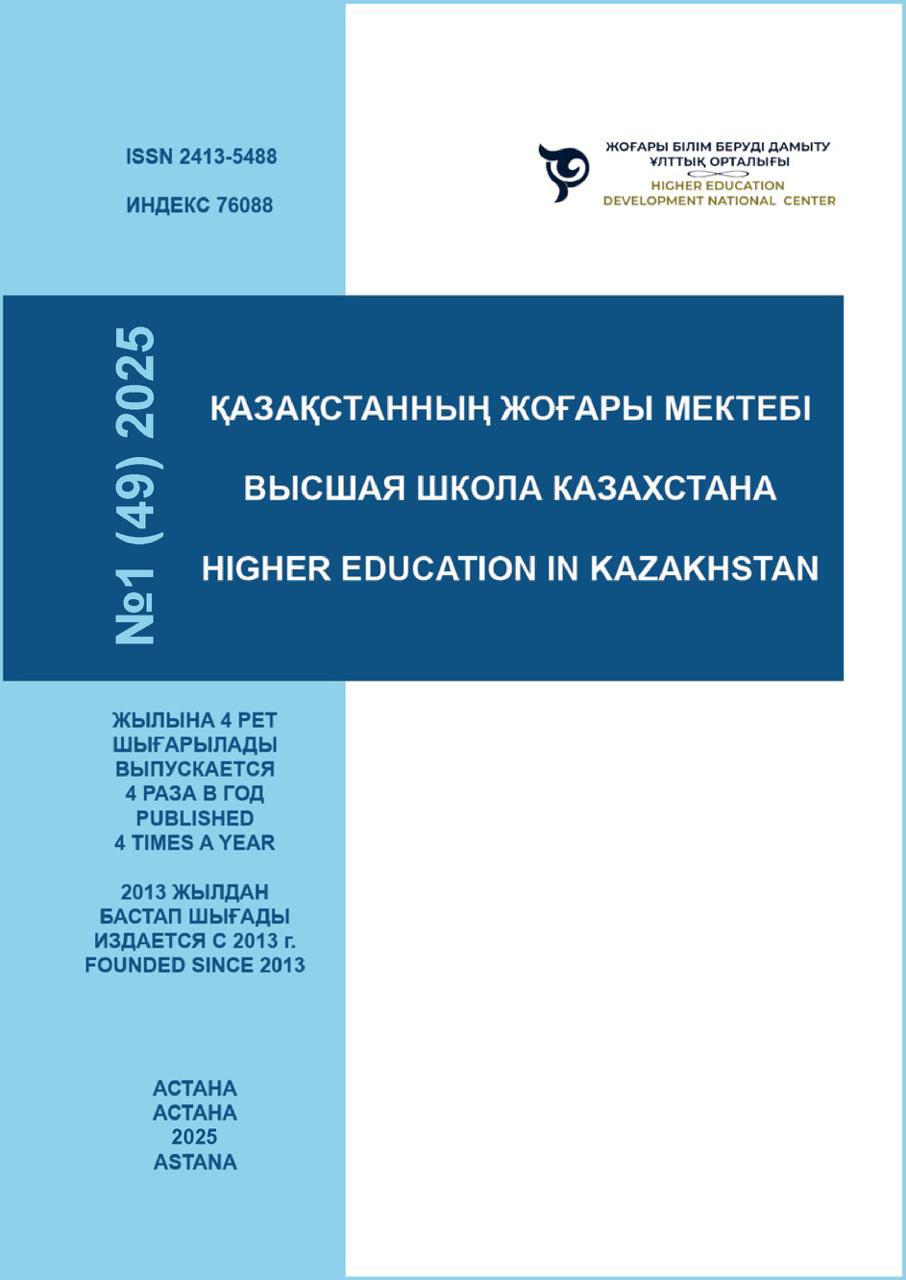THE STRUCTURE OF METHODOLOGICAL COMPETENCE OF UNIVERSITY TEACHERS AND THE LEVELS OF ITS DEVELOPMENT
DOI:
https://doi.org/10.59787/2413-5488-2025-49-1-129-138Кілт сөздер:
methodological competence, university instructors, pedagogical knowledge, professional development, digital learning, higher education, assessment strategies, teaching innovation, blended learning, student-centered learning.Аңдатпа
The development of methodological competence among university instructors is a key factor in improving the quality of higher education and adapting to modern educational challenges. This study explores the structure, components, and levels of methodological competence, emphasizing the need for continuous professional development. A mixed-methods approach was employed, combining theoretical analysis with a review of the best global practices. The findings suggest that methodological competence encompasses pedagogical knowledge, research skills, adaptability, and innovation. The study also proposes a five-level classification system to assess instructors' methodological competence. Enhancing this competence through targeted professional development and digital learning strategies is crucial for improving teaching effectiveness and student outcomes in higher education.
Әдебиеттер тізімі
Agnihotri, S. (2024). The Role of Reflective Practice in Enhancing Teacher Efficacy. Educational Administration: Theory and Practice, 1689–1696. https://doi.org/10.53555/kuey.v30i6.5574.
Brookfield, S. (1996). Becoming a critically reflective teacher. Choice Reviews Online, 33(09), 33–5232. https://doi.org/10.5860/choice.33-5232.
Caena, F., & Redecker, C. (2019). Aligning teacher competence frameworks to 21st century challenges: The case for the European Digital Competence Framework for Educators (Digcompedu). European Journal of Education, 54(3), 356–369. https://doi.org/10.1111/ejed.12345.
Creswell, J. W. (1994). Research Design: Qualitative, quantitative, and mixed methods approaches. http://www.revistacomunicacion.org/pdf/n3/resenas/research_design_qualitative_quantitative_and_mixed_methods_approaches.pdf.
Darling-Hammond, L. (2017). Teacher education around the world: What can we learn from international practice? European Journal of Teacher Education, 40(3), 291–309. https://doi.org/10.1080/02619768.2017.1315399.
Gibbs, G. (1988). Learning by doing: A guide to teaching and learning methods. https://ci.nii.ac.jp/naid/10013454789.
Hargreaves, A., & Fullan, M. (2012). Professional Capital: Transforming teaching in every school. http://ci.nii.ac.jp/ncid/BB18399261.
Hodges, C. B., Moore, S., Lockee, B. B., Trust, T., & Bond, M. A. (2024). The Difference between Emergency Remote Teaching and Online Learning. In BRILL eBooks (pp. 511–522). https://doi.org/10.1163/9789004702813_021.
Kassenov, N. K., Mukhatayev, N. А., Omirbayev, N. S., Omarova, N. S., & Toxanov, N. S. (2022). Domestic and international experience in organizing the process of professional competence development of teachers. Bulletin of Toraighyrov University Pedagogics Series, 4.2022, 331–342. https://doi.org/10.48081/jbrv7653.
Korthagen, F. A. (2004). In search of the essence of a good teacher: towards a more holistic approach in teacher education. Teaching and Teacher Education, 20(1), 77–97. https://doi.org/10.1016/j.tate.2003.10.002.
Lunenberg, M., Korthagen, F., & Swennen, A. (2006). The teacher educator as a role model. Teaching and Teacher Education, 23(5), 586–601. https://doi.org/10.1016/j.tate.2006.11.001.
Mishra, P., & Koehler, M. J. (2006). Technological Pedagogical Content Knowledge: a framework for teacher knowledge. Teachers College Record the Voice of Scholarship in Education, 108(6), 1017–1054. https://doi.org/10.1111/j.1467-9620.2006.00684.x.
Mukhatayev, A., Omirbayev, S., Kassenov, K., Biloshchytskyi, A., & Omarova, S. (2024). Perception of IT teachers on their methodological development: A case at Kazakhstan universities. International Journal of Innovative Research and Scientific Studies, 7(4), 1354–1364. https://doi.org/10.53894/ijirss.v7i4.3297.
Selwyn, N. (2010). Schools and schooling in the digital age. In Routledge eBooks. https://doi.org/10.4324/9780203840795.
Shulman, L. S. (1986). Those who understand: Knowledge growth in teaching. Educational Researcher, 15(2), 4–14. https://doi.org/10.3102/0013189x015002004.
Tondeur, J., Roblin, N. P., Van Braak, J., Fisser, P., & Voogt, J. (2012). Technological pedagogical content knowledge in teacher education: in search of a new curriculum. Educational Studies, 39(2), 239–243. https://doi.org/10.1080/03055698.2012.713548.
Williams, J. K. (2008). The Handbook of Blended Learning: Global Perspectives, Local Designs, by Curtis J. Bonk and Charles R. Graham (Eds.). San Francisco, CA: John Wiley and Sons, 2006. 580 pages, hard coverThe Handbook of Blended Learning: Global Perspectives, Local Designs, by BonkCurtis J. and GrahamCharles R. (Eds.). San Francisco, CA: John Wiley and Sons, 2006. 580 pages, hard cover. Academy of Management Learning and Education, 7(1), 132–133. https://doi.org/10.5465/amle.2008.31413871.

Жүктеулер
Жарияланды
Журналдың саны
Бөлім
Лицензия
Авторлық құқық (c) 2025 "Қазақстанның жоғары мектебі" ғылыми-сараптамалық журналы

Бұл жұмыс Creative Commons Attribution-Коммерциялық емес 4.0 халықаралық лицензиясы.





